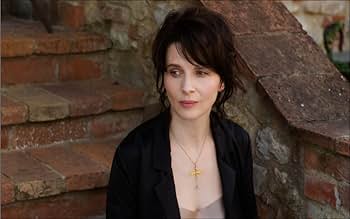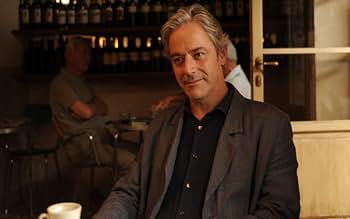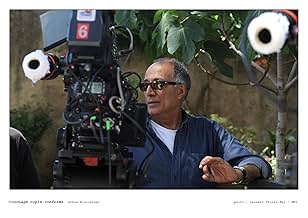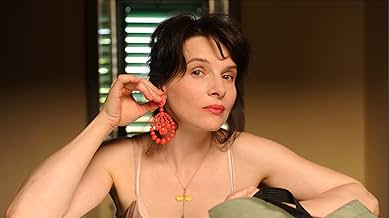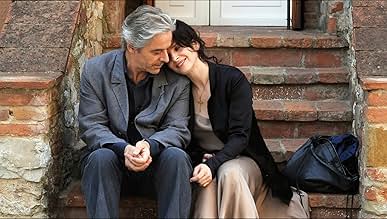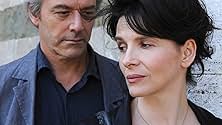In Toscana per promuovere il suo ultimo libro, uno scrittore britannico di mezza età incontra una donna francese che lo porta nel villaggio di Lucignano. Mentre sono lì, una domanda casuale ... Leggi tuttoIn Toscana per promuovere il suo ultimo libro, uno scrittore britannico di mezza età incontra una donna francese che lo porta nel villaggio di Lucignano. Mentre sono lì, una domanda casuale rivela qualcosa di più profondo.In Toscana per promuovere il suo ultimo libro, uno scrittore britannico di mezza età incontra una donna francese che lo porta nel villaggio di Lucignano. Mentre sono lì, una domanda casuale rivela qualcosa di più profondo.
- Regia
- Sceneggiatura
- Star
- Premi
- 11 vittorie e 29 candidature totali
- Le marié
- (as Filippo Troiano)
- La mariée
- (as Manuela Balsinelli)
Recensioni in evidenza
They stop in a museum before the picture of a portrait, thought for centuries to be the original, though lately discovered to have been only a perfect copy. What value has changed in this object, what new perception now regards it, this is where I believe this is best unraveled.
Things change the man quips philosophically, an intellectual much like Kiarostami perhaps. Yet we see the same cypresses standing by the same old road, the same plazas and hotels they once visited, then young and booming with love. Having spoken so well, we see however that the man understands little of that. He can't even enjoy a simple glass of wine without complaining that it is corked, what should be a simple pleasure is tainted by the gross irritation that comes from too much satisfaction. Having satisfied our desires so many times, in so many different ways, we can see that we are no closer to happiness.
Where does this weariness then, born from too much familiarity, from having seen or tasted too much, come from and why does it invest our gaze with this constant dissatisfaction? Another line of thought to connect the web of allusions. The woman, who has made herself beautiful for him in the day of their anniversary, says he doesn't see her anymore. He looks at her but doesn't see, meaning something has dissipated with time, grown withered in his eyes, though she is still the same, except a little older.
Kiarostami perfectly visualizes the burden that saddles these people in the scene where they are driving around town in the car. On the windshield we see cast over their faces the reflections of buildings gliding by, not simply the gap that exists between them, indeed between any two human beings, but the burden of time, life passing them over. In a poignant metaphor, we see them move through existence.
A perfect copy, the original, two identical objects which we are taught to perceive differently. The lines being the same in the same places, the hues of color painted exactly the same, the one intrinsic value that separates the two is merely time. Which is to say that as humans, who wither away with time, we allow ourselves to regard it as the most precious good, the one we cannot buy or sell. The movie shows us how, although we may understand our transience as an idea, we live as though we will always be here, as though we have time enough to postpone a small gesture of affection.
But if we simply perceive the world around us, this present moment? This draught of air now coming from an open window or this glass of wine? Or indeed this woman who has made herself beautiful for us?
This is a great film by one of the few gifted filmmakers of our times, perhaps his first truly great one. In the right ears, this will be a sutra that will permit us to meditate on fundamental precepts of existence, how time thought to matter matters little, how craving and ego blind us. How ultimately, like a mandala upon which Tibetan monks work tirelessly day and night only to destroy it upon completion, life is to be lived in full, with knowledge that it will come to pass.
The Review: Juliette Binoche has had a career spanning nearly thirty years, and for much of that has jumped between roles in her natural language and English. You might think that, with the supposed paucity of good female roles in movies, that there's not much left for Binoche to cover that she hasn't before, but here she gets to explore some new territory to Cannes best actress award-winning effect. In the process, she gets to cover a range of languages, not only English and French but Italian, but in this case there is a specific purpose to the variances of the language.
The set-up is simple: William Shimell plays James Miller, an British author on a tour of Tuscany where his work on originality in art has been better received than in his homeland. Binoche is the woman who comes to hear his talk, and the two are then drawn together in a discussion of his work. Once the two meet again, the course of the movie charts their discussions over the course of an afternoon, taking in the Italian countryside and engaging with a number of characters along the way who cause them to reflect on their differing viewpoints on Miller's work.
There's a turning point as we approach the halfway mark where one of those characters seemingly mistakes the pair for a married couple. What starts as a role play, set off by the misunderstanding, takes on more and more aspects, and eventually both the pair and the audience are lost in the drama. The whole movie reveals itself to be an intricate construct on this concept, almost every aspect of the theme, the performances or the setting playing with the motif of originality versus imitation. Reflections in car windows sometimes obscure the actors themselves, POV shots ask us to engage directly in the drama almost as a participant and this even extends to the leading pair themselves – Shimell is a renowned baritone, not an actor, and there is a slight but noticeable difference between his performance and that of Binoche, which almost feels like a copy of acting rather than being fully immersed in the role.
While this reinforces the concept, it does prevent the audience from fully engaging, being kept slightly at arm's length by the constant artifice. That's not to say that there's not a lot to enjoy here, with the confusions and the tensions making this verge on a romantic comedy at times. Despite the differences in acting ability, Shimell and Binoche make an engaging couple at times and as time wears on, you find yourself more keen to believe that the beginning was the illusion and that their relationship is real and not the copy. Much of the credit for this must be placed at Binoche's door, using the language differences to vary mood effectively, but also adding colour and emotion in all of the languages she uses. The only one here who's on familiar ground is director Kiarostami, who's explored these themes before but never to such mainstream effect – worth checking out if you'd like to engage your mind and your heart.
Why see it at the cinema: There is a very literal aspect of the visuals which runs throughout the course of the movie, which the cinema screen will allow you to fully appreciate.
The score: 7/10
The film forces us to wonder to what extent the relationship between the two central characters is real, or an imitation of a once real relationship. It asks is a real relationship any better than a certified copy i.e a fake relationship where both parties pretend it is real. That is the central question - the value of the authentic versus the value of the fake.
Not entirely convincing, but an excoriating watch nonetheless. When this film was finished, I felt like I had just witnessed an entire relationship, from the first fruitful seeds, to infatuation and love and friction and wear and decay, and in a sense I had because that is essentially what the two characters of the film take us through. The film begins with William Shimell, playing the role of modest and charming British academic who is promoting his book in Italy. The idea of this book gives the film its title and what the whole film begins to play around with: the copy. The copy, and it's relation to the original, its authenticity, and whether one should invest any time in an original if a recreation is believable. He would answer 'no' to that last thought. Juliette Binoche appears at his speech, leaves his translator a note, and the next day he appears at her small museum/exhibition/trinket shop, artistic debate is continued, and thus their journey begins. The boundaries of conversation between two people who are seemingly strangers soon dissolves and they are soon fluctuating between moments of bitterness, delight and contemplation, and soon enough in what appears to be a bizarre role-play, the assume the role of a married couple and any façade that they try to wear is soon being flayed.
Binoche is utterly captivating and her award for Best Actress at Cannes is entirely deserved. She is seemingly inexhaustible, communicating in Italian, French and English and losing no degree of vulnerability, bitterness or magnetism between the languages, and she has a remarkable way of kind of softly inhabiting any given situation but being able to turn caustic and uncomfortable with immediacy. There are moments when the characters are sitting opposite each other in conversation and they are speaking directly into the camera, and when Binoche does this it's never less than transfixing.
Shimmel, for a first time actor is for the most part quite grounded and reserved, but it's with him that the film often feels at its flattest. He's the more outwardly ruminating intellectual, always approaching things with a contemplative thought, and it often feels like the film is struggling to maintain a deep thought, as if in fear of being mocked for being nothing less than poetic. Maybe that's the way the character is supposed to be, but all his affectations get tiring. He comments on Eucalyptus trees being so totally unique, how each one has its own shape and definition and being unlike the other one, and as truthful as it might be, it's just a comment that leaves you thinking 'And?' At other times the exchanges of these characters are scintillating, as when an innocuous pit-stop at a café becomes changes the gears of their relationship, and Binoche begins to furiously criticise his cool, charming bullshit-masquerade. The dialogue operates in these two modes, between fascinating and questionable, but never really finds its footing.
Abbas Kiarostami is clearly a man who knows exactly what he wants to do and how to do it, and at the jolly age of 74 all the wisdom and joy and despair he must have accumulated in his lifetime can be felt here, in the vivaciousness and the bitterness of the characters, in the way a camera can just sit and stay trained for minutes on end and let the people unfurl themselves, but sometimes it feels like all he is trying to much to do justice to all his collected experience in life. There's a shot toward the end with our couple standing in a courtyard together and just in front of them is a far older couple, man and wife, standing on the same side of each other, tentatively walking and supporting each other. The imagery is obvious but the connotations are beautiful, and it's the sort of a shot that could only have worked as aposiopesis to the journey preceding it. (Maybe that is the point)
So there was an ambivalence I felt throughout the film, but it's hard to dismiss something this lovingly made, as an expression of the melancholy of our relationships in life. There's a blustery and picturesque feel throughout this Italian journey that is hard to argue with.
Lo sapevi?
- QuizDuring a visit in Tehran by Juliette Binoche, Abbas Kiarostami told Binoche the synopsis of Certified Copy as a casual anecdote, which she said that she fully believed until he confessed to having made it up. According to Kiarostami, studying the reactions of Binoche as she listened to the story was a vital part of the film's further development.
- Citazioni
James Miller: It seems to me that the human race is the only species who have forgotten the whole purpose of life, the whole meaning of existence is to have fun, to have pleasure. And here is someone who's found their own way to do it. We shouldn't judge them for it. If they're happy and enjoying life, we should congratulate them, not criticize them.
- ConnessioniFeatured in Breakfast: Episodio datato 31 agosto 2010 (2010)
- Colonne sonoreO surdato 'nnamurrato
Written by Aniello Califano (as A. Califano) and the music by Enrico Cannio (as E. Cannio)
I più visti
- How long is Certified Copy?Powered by Alexa
Dettagli
- Data di uscita
- Paesi di origine
- Siti ufficiali
- Lingue
- Celebre anche come
- Certified Copy
- Luoghi delle riprese
- Aziende produttrici
- Vedi altri crediti dell’azienda su IMDbPro
Botteghino
- Budget
- 7.000.000 € (previsto)
- Lordo Stati Uniti e Canada
- 1.373.975 USD
- Fine settimana di apertura Stati Uniti e Canada
- 77.937 USD
- 13 mar 2011
- Lordo in tutto il mondo
- 7.736.632 USD
- Tempo di esecuzione1 ora 46 minuti
- Colore
- Mix di suoni
- Proporzioni
- 1.85 : 1
Contribuisci a questa pagina





